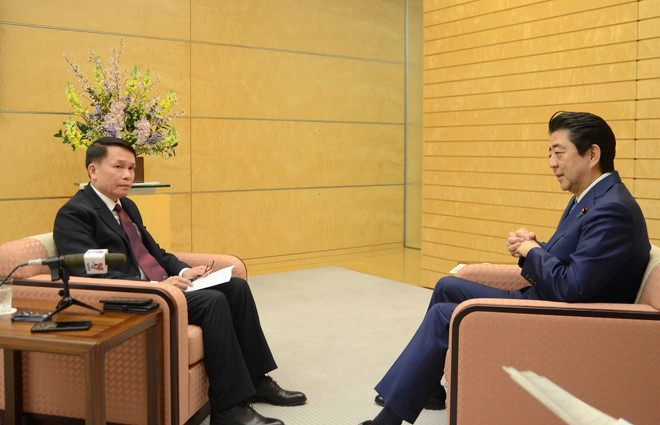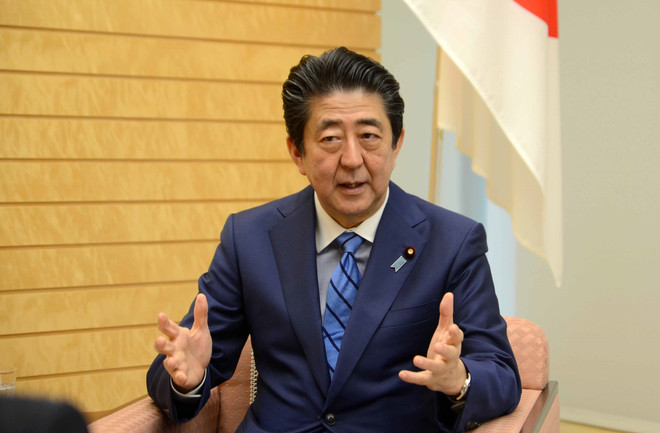 Japanese Prime Minister Shinzo Abe (R) grants an exclusive interview to General Director of the Vietnam News Agency (VNA) Nguyen Duc Loi who is paying a working visit to Japan (Photo: VNA)
Japanese Prime Minister Shinzo Abe (R) grants an exclusive interview to General Director of the Vietnam News Agency (VNA) Nguyen Duc Loi who is paying a working visit to Japan (Photo: VNA)Tokyo (VNA) – The defining aim ofthe Vietnam-Japan partnership is to contribute to regional peace andprosperity, Japanese Prime Minister Shinzo Abe said in an exclusive interviewgranted to General Director of the Vietnam News Agency (VNA) Nguyen Duc Loi,who is paying a working visit to Japan.
The two countries havebeen enjoying dynamic economic cooperation and people-to-people economic exchanges,the PM said, adding that Japan is keen to partner with Vietnam to addressdefence and security matters, regional issues, and economic development.
PM Abe said he has been a congressman for 25years and that when he was first elected as a congressman, he and otherparliamentarians visited Vietnam and received a warm welcome from theVietnamese Government. Vietnam’s economy at that time was developing in leapsand bounds thanks to the implementation of reform policies, he said.
The PM continued that he also visited Vietnam inhis first term as the Prime Minister in 2006. So far, he has visited Vietnamfour times in his capacity as the Japanese Prime Minister, Abe said, addingthat he was glad to witness the vibrant development of the Southeast Asian country.
He recalled his visitto Vietnam in November 2017, during which he was invited to Hoi An by PrimeMinister Nguyen Xuan Phuc. The two PMs walked around the Vietnamese ancientcity and visited the Japanese bridge, as well as a number of shops where Japanesepeople used to trade in ancient times, through which he better understood thehistory of exchange between the two countries.
While sharing hisexpectations on the potential to develop the friendly and cooperative ties betweenVietnam and Japan, PM Abe said the bilateral relations must also be mutuallysupportive and collaborative.
In the eyes of Japanesepeople, Vietnam is an industrious, smart, and patient nation with warm-hearted people,PM Abe said, noting that the number of people travelling between the twocountries has amounted to 1.2 million while there are some 300,000 Vietnameseresiding in Japan.
He highly appreciatedthose Vietnamese people who have become familiar with Japanese language andculture.
The PM hoped moreVietnamese skilled workers would come to work in Japan as its new policy toreceive foreign workers takes effect from April 1, 2019.
As Japan is scheduled to host the 2020 Olympicand Paralympic Games in Tokyo, PM Abe said he hopes many Vietnamese sportsteams will join the competitions and a large number of Vietnamese will visitJapan to watch the sporting event.
Regarding theComprehensive and Progressive Agreement for Trans-Pacific Partnership (CPTPP), PMAbe said the birth of the deal was an important and meaningful result topromote free trade, especially as there is increasing global concern over tradeprotection policies.
This was also theoutcome of the close connectivity between Japan and Vietnam, he said, addingthat the agreement was very important and progressive for the 21st centurybecause it covers numerous issues such as intellectual property protection,labour mechanisms, the environment, and competition regulations for state-ownedenterprises.
Thanks to that, a new economic region will be built based on fairness andfreedom, he said, adding that the Asia-Pacific region will become a place tocreate that economic model.
He hoped that Vietnam would be able to optimisebenefits from the deal to further develop its economy and improve the living conditionsof its people.
The PM also expressedhis belief that the CPTPP will help promote trade and economic exchangesbetween Vietnam and Japan.
The stable and peacefulAsia-Pacific region will lay a foundation to develop peace and prosperity inJapan and Vietnam, he said. Japan wants to cooperate with all nations,including Vietnam, to jointly create a free and expansive Asia-Pacific region,he said.
The PM also recommended popularising andreinforcing the spirit of respecting law and freedom of navigation and trade,as well as looking toward to the goal of economic development throughincreasing multinational connectivity in the region, ensuring peace and stabilityvia law enforcement on the seas, and building humanitarian aid and research alongsiderescue capacity.–VNA





























